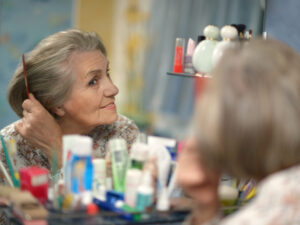Common Causes for Hair Loss in Senior Women
Although no one likes the idea of losing hair as they age, men often understand that it’s a fact of life and thus aren’t ashamed or embarrassed when their hair thins or balding areas start to appear. They generally don’t worry about others looking at their hairline and wondering what has happened.
But for elderly women, many become stressed and worried when they see that their hair is thinning enough to be noticed or they can actually spot areas that appear bald. If your aging loved one is noticing thinner hair, she’s not alone. It’s estimated that more than 50 percent of older women experience some degree of hair loss. While there’s not a lot that can be done for most hair loss, you and your loved one’s senior care team should be gentle and help her maintain her hair the best that she can.
Here are the most common reasons elderly women have hair loss.

Senior Home Care Rockford, MI: Senior Hair Loss
- Health issues. There are some diseases and illnesses that cause hair loss. Both diabetes and thyroid problems can trigger hair loss because they affect metabolism and hormone levels in the body, which in turn affects hair health and growth. If your loved one has either of these conditions, hair health is just one reason that managing it and keeping it under control is so important.
- Medication or Treatment side effects. While most people understand that undergoing chemotherapy may cause the hair to fall out, it is not the only medication or medical treatment that can have that side effect. While chemotherapy is usually quite dramatic (losing all of the hair at almost one time), medications for depression, gout, and thinning the blood can cause gradual hair loss that shows up over time. If your loved one takes any medication regularly with that side effect, you and your senior care provider will want to be extra gentle when combing or washing her hair so that you don’t do more damage than good.
- Poor Nutrition. The hair follicles need good nutrition to stay strong and healthy. Since some seniors struggle with eating right and eating enough nutritious calories, they become malnourished and as a result, the hair begins to fall out and break due to weakness. If your senior care provider helps with meals, have her make sure your loved one is getting plenty of foods that contain Vitamin A, Vitamins B6, B12, and Vitamin C.
- Their Age. Just getting older, even for the most healthy individuals, causes changes in the body that may result in hair loss. An older person’s hair follicles don’t create hair as quickly as a younger person, so when hair falls out, it takes longer for it to be replenished. Menopause can also affect the hormones that promote hair growth.
Learning how to care for your senior’s hair, and showing others like her senior care team, can help the hair she has stay healthy and look beautiful.
If you or someone you know needs help with Senior Home Care in Rockford, MI, contact Gauthier Family Home Care. We provide quality and affordable home care services in our community. Call us at (616) 258-2300 for more information.
https://my.clevelandclinic.org/health/diseases/16921-hair-loss-in-women
- Caregiver of the Month – June 2025 - June 2, 2025
- Common Sense Summer Tips for Seniors to Help Them Beat the Heat - May 28, 2025
- How Home Care Helps Seniors Maintain a Cleaner Home - May 22, 2025
